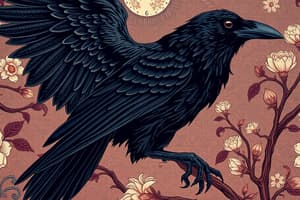Podcast
Questions and Answers
What is the term for the moment in a literary work when the protagonist experiences a sudden realization or discovery about their true identity or situation?
What is the term for the moment in a literary work when the protagonist experiences a sudden realization or discovery about their true identity or situation?
- Anagnorisis (correct)
- Climax
- Denouement
- Prologue
In epic literature, what do epic similes primarily involve?
In epic literature, what do epic similes primarily involve?
- Allegorical representations of the hero's journey
- Extended comparisons using 'like' or 'as' (correct)
- Metaphorical language without using 'like' or 'as'
- Direct comparisons between two unrelated things
What is the main function of epithets in epic literature?
What is the main function of epithets in epic literature?
- To confuse the reader about character identities
- To provide stock descriptive words and phrases for characters (correct)
- To introduce new characters abruptly
- To create suspense in the plot
Which character archetype involves a heroic figure who rescues a damsel in distress?
Which character archetype involves a heroic figure who rescues a damsel in distress?
In Aristotle's poetics, what did Thespis, the first actor, exemplify by portraying different characters with masks?
In Aristotle's poetics, what did Thespis, the first actor, exemplify by portraying different characters with masks?
What aspect of narrative style is emphasized in epic literature through its serious tone and elevated language?
What aspect of narrative style is emphasized in epic literature through its serious tone and elevated language?
What is the term used for the proper purgation of pity and fear through the downfall of the tragic protagonist?
What is the term used for the proper purgation of pity and fear through the downfall of the tragic protagonist?
Which characteristic is NOT typically associated with a tragic hero?
Which characteristic is NOT typically associated with a tragic hero?
In literature, what term describes the moment when the tragic hero gains self-knowledge through their downfall?
In literature, what term describes the moment when the tragic hero gains self-knowledge through their downfall?
Which author is associated with the Gothic literary genre in the 19th century?
Which author is associated with the Gothic literary genre in the 19th century?
Which element is commonly found in horror literature as a personification of mortality and inevitability?
Which element is commonly found in horror literature as a personification of mortality and inevitability?
Which characteristic is NOT typically associated with a tragic protagonist's fortune in literature?
Which characteristic is NOT typically associated with a tragic protagonist's fortune in literature?
What is the term used to describe the shift of the tragic protagonist's fortune from good to bad, as discussed by Aristotle in the Poetics?
What is the term used to describe the shift of the tragic protagonist's fortune from good to bad, as discussed by Aristotle in the Poetics?
Which term refers to the moment in a story when a character experiences a significant discovery or realization?
Which term refers to the moment in a story when a character experiences a significant discovery or realization?
In Gothic literature of the 19th century, what are the predominant single effects created by the elements of fiction?
In Gothic literature of the 19th century, what are the predominant single effects created by the elements of fiction?
Which setting elements are commonly emphasized in horror literature to create fear and terror?
Which setting elements are commonly emphasized in horror literature to create fear and terror?
In tragic hero characteristics, what emotion does the tragic hero typically evoke in viewers according to Aristotle?
In tragic hero characteristics, what emotion does the tragic hero typically evoke in viewers according to Aristotle?
Which term describes the concept in formalist criticism where events in a tragedy reverse unexpectedly?
Which term describes the concept in formalist criticism where events in a tragedy reverse unexpectedly?
Flashcards are hidden until you start studying
Study Notes
Tragic Hero
- A noble character with a flaw (hamartia) that leads to their downfall, evoking pity and fear in the audience
- The flaw is a characteristic that ultimately causes the hero's demise
Tragedy (Aristotle)
- An imitation of a serious action, complete in itself, written in an embellished language
- Arousing pity and fear in the viewer, bringing about catharsis (purgation of emotions)
Greek Tragedy
- A serious action with a certain magnitude, complete in itself
- Written in an embellished language, aiming to evoke pity and fear, leading to catharsis
- Examples: Oedipus Rex, Greek Tragedy
Gothic Fiction
- Emerged in the 19th century, characterized by fear, horror, and terror
- Settings: dark, focusing on death, emphasizing the fleeting nature of life
- Characters: mysterious, often wealthy, but unable to escape death
Epic
- An imitation of an action, serious and complete in itself, written in an elevated style
- Centers on the hero's struggle against an obstacle or series of obstacles
- Epic Similes: extended comparisons using "like" or "as"
- Examples: heroic quests, perilous journeys, valorous deeds
Poetics
- Thespis: the first actor to perform around 534 BC, wearing no makeup and no props
- Oedipus Rex: a prime example of a poetics
- Plato: reality is in the mind, and there should be one version of reality
Studying That Suits You
Use AI to generate personalized quizzes and flashcards to suit your learning preferences.




